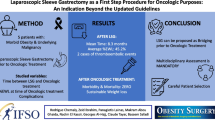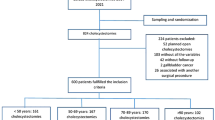Abstract
Background
The proportion of elderly patients who undergo surgery has rapidly increased. However, clinical indicators that predict outcomes are limited. Frailty is thought to estimate physiological reserves, although its use has not been evaluated in laparoscopic surgical patients. This study aimed to evaluate the significance of preoperative modified frailty index (PMFI) in octogenarians undergoing a laparoscopic gastrectomy.
Methods
We reviewed prospectively collected data from 119 patients with gastric cancer (GC) aged 80 years or older who underwent a radical laparoscopic gastrectomy (RLG) between January 2007 and December 2012. Three baseline frailty traits were measured using routine preoperative laboratory data: albumin < 3.4 g/dL, haematocrit < 35%, and creatinine > 2 mg/dL. Patients were categorized by the number of positive traits as follows: low preoperative modified frailty index (LPMFI): 0–2 traits and high preoperative modified frailty index (HPMFI): 3 traits. We compared patient characteristics, operative outcomes, pathological results, morbidity, and survival.
Results
A total of 43 (36.1%) patients were considered HPMFI, and 76 (63.9%) patients were considered LPMFI. HPMFI was associated with an increased risk of postoperative complications (HPMFI group: odds ratio 2.506; 95% CI, 1.113–5.643, P = 0.027). With a median follow-up of 39.0 months, the 3-year overall survival (OS), recurrence-free survival (RFS), and cancer-specific survival (CSS) rates for the entire cohort were 47.9, 34.3, and 51.7%, respectively. Significant differences were observed in OS (HPMFI group, 37.2%; LPMFI group, 53.9%; P = 0.038) and RFS (HPMFI group, 23.3%; LPMFI group, 40.5%; P = 0.012) between the groups, but no difference was found for CSS (HPMFI group, 43.5%; LPMFI group, 56.4%; P = 0.078).
Conclusions
HPMFI based on an easily calculable preoperative measure may be useful for predicting postoperative complications and have a negative impact on 3-year OS and RFS after an RLG in octogenarians. Therefore, HPMFI can serve as a low-cost, simple screen for high-risk individuals who might suffer more than expected during the postoperative period after an RLG.



Similar content being viewed by others
References
Shin A, Kim J, Park S (2011) Gastric cancer epidemiology in Korea. J Gastric Cancer 11:135–140
Korc-Grodzicki B, Downey RJ, Shahrokni A, Kingham TP, Patel SG, Audisio RA (2014) Surgical considerations in older adults with cancer. J Clin Oncol 32:2647–2653
Takeshita H, Ichikawa D, Komatsu S, Kubota T, Okamoto K, Shiozaki A, Fujiwara H, Otsuji E (2013) Surgical outcomes of gastrectomy for elderly patients with gastric cancer. World J Surg 37:2891–2898
Fujiwara Y, Tsujie M, Hara J, Kato H, Kitani K, Isono S, Takeyama H, Yukawa M, Inoue M, Kanaizumi H (2014) Comparison of gastric cancer surgery between patients aged> 80 years and < 79 years: complications and multivariate analysis of prognostic factors. Hepato-Gastroenterol 61:1785–1793
Clegg A, Young J, Iliffe S, Rikkert MO, Rockwood K (2013) Frailty in elderly people. Lancet 381:752–762
Robinson TN, Eiseman B, Wallace JI, Church SD, McFann KK, Pfister SM, Sharp TJ, Moss M (2009) Redefining geriatric preoperative assessment using frailty, disability and co-morbidity. Ann Surg 250:449–455
Oresanya LB, Lyons WL, Finlayson E (2014) Preoperative assessment of the older patient: a narrative review. JAMA 311:2110–2120
Ma L, Zhang L, Tang Z, Sun F, Diao L, Wang J, Zhao X, Ge G (2016) Use of the frailty index in evaluating the prognosis of older people in Beijing: a cohort study with an 8-year follow-up. Arch Gerontol Geriatr 64:172–177
Ness KK, Krull KR, Jones KE, Mulrooney DA, Armstrong GT, Green DM, Chemaitilly W, Smith WA, Wilson CL, Sklar CA, Shelton K, Srivastava DK, Ali S, Robison LL, Hudson MM (2013) Physiologic frailty as a sign of accelerated aging among adult survivors of childhood cancer: a report from the St Jude lifetime cohort study. J Clin Oncol 31:4496–4503
Jeong O, Park YK, Ryu SY, Kim YJ (2010) Effect of age on surgical outcomes of extended gastrectomy with D2 lymph node dissection in gastric carcinoma: prospective cohort study. Ann Surg Oncol 17:1589–1596
Hayashi T, Yoshikawa T, Aoyama T, Ogata T, Cho H, Tsuburaya A (2012) Severity of complications after gastrectomy in elderly patients with gastric cancer. World J Surg 36:2139–2145
Kitano S, Shiraishi N, Fujii K, Yasuda K, Inomata M, Adachi Y (2002) A randomized controlled trial comparing open vs laparoscopy-assisted distal gastrectomy for the treatment of early gastric cancer: an interim report. Surgery 131(1 Suppl):S306–S311
Huscher CG, Mingoli A, Sgarzini G, Sansonetti A, Di Paola M, Recher A, Ponzano C (2005) Laparoscopic versus open subtotal gastrectomy for distal gastric cancer: five-year results of a randomized prospective trial. Ann Surg 241:232–237
Kim MG, Kim HS, Kim BS, Kwon SJ (2013) The impact of old age on surgical outcomes of totally laparoscopic gastrectomy for gastric cancer. Surg Endosc 27:3990–3997
Yasuda K, Sonoda K, Shiroshita H, Inomata M, Shiraishi N, Kitano S (2004) Laparoscopically assisted distal gastrectomy for early gastric cancer in the elderly. Br J Surg 91:1061–1065
Japanese Gastric Cancer Association (2011) Japanese classification of gastric carcinoma: 3rd English edition. Gastric Cancer 14:101–112
Sobin LH, Gospodarowicz MK, Wittekind C (2010) International Union Against Cancer (UICC) TNM classification of Malignanttumours, 7th edn. Wiley, New York
Huang CM, Zheng CH (2015) Laparoscopic gastrectomy for gastric cancer. Springer, Berlin
Lu J et al (2017) The preoperative frailty versus inflammation-based prognostic score: which is better as an objective predictor for gastric cancer patients 80 years and older? Ann Surg Oncol 24(3):754–762
Huang C-M, Tu R-H, Lin J-X (2015) A scoring system to predict the risk of postoperative complications after laparoscopic gastrectomy for gastric cancer based on a large-scale retrospective study. Medicine 94(17):e812
Dindo D, Demartines N, Clavien PA (2004) Classification of surgical complications: a new proposal with evaluation in a cohort of 6336 patients and results of a survey. Ann Surg 240:205–213
Polanczyk CA, Marcantonio E, Goldman L, Rohde LE, Orav J, Mangione CM, Lee TH (2001) Impact of age on perioperative complications and length of stay in patients undergoing noncardiac surgery. Ann Intern Med 134:637–643
Koo CY, Hyder JA, Wanderer JP, Eikermann M, Ramachandran SK (2015) A meta-analysis of the predictive accuracy of postoperative mortality using the American Society of Anesthesiologists’ physical status classification system. World J Surg 39:88–103
Robinson TN, Wu DS, Pointer L, Dunn CL, Cleveland JC, Moss M (2013) Simple frailty score predicts postoperative complications across surgical specialties. Am J Surg 206:544–550
Makary MA, Segev DL, Pronovost PJ, Syin D, Bandeen-Roche K, Patel P, Takenaga R, Devgan L, Holzmueller CG, Tian J, Fried LP (2010) Frailty as a predictor of surgical outcomes in older patients. J Am Coll Surg 210:901–908
Tegels JJ, de Maat MF, Hulsewé KW, Hoofwijk AG, Stoot JH (2014) Value of geriatric frailty and nutritional status assessment in predicting postoperative mortality in gastric cancer surgery. J Gastrointest Surg 18:439–445 (discussion: 445–446)
Tegels JJ, de Maat MF, Hulsewé KW, Hoofwijk AG, Stoot JH (2014) Value of geriatric frailty and nutritional status assessment in predicting postoperative mortality in gastric cancer surgery. J Gastrointest Surg 18:439–446
Mochiki E, Ohno T, Kamiyama Y, Aihara R, Nakabayashi T, Asao T, Kuwano H (2005) Laparoscopy-assisted gastrectomy for early gastric cancer in young and elderly patients. World J Surg 29:1585–1591
Barbosa J, Carneiro S, Preto J, Sousa H, Pinho A, Maia C (2013) Laparoscopic gastrectomy after the age of eighty: still a good choice? J Cancer Ther 4:27–30
Keenan LG et al (2017) Assessment of older patients with cancer: Edmonton Frail Scale (EFS) as a predictor of adverse outcomes in older patients undergoing radiotherapy. J Geriatr Oncol 8(3):206–210
Rolfson DB, Majumdar SR, Tsuyuki RT, Tahir A, Rockwood K (2006) Validity and reliability of the Edmonton Frail Scale. Age Ageing 35(5):526–529
Hamaker ME, Vos AG, Smorenburg CH, de Rooij SE, van Munster BC (2012) The value of geriatric assessments in predicting treatment tolerance and all-cause mortality in older patients with cancer. Oncologist 17(11):1439–1449
Revenig LM, Canter DJ, Master VA, Maithel SK, Kooby DA, Pattaras JG, Tai C, Ogan K (2014) A prospective study examining the association between preoperative frailty and postoperative complications in patients undergoing minimally invasive surgery. J Endourol 28:476–480
Obeid NM, Azuh O, Reddy S, Webb S, Reickert C, Velanovich V, Horst HM, Rubinfeld I (2012) Predictors of critical care-related complications in colectomy patients using the National Surgical Quality Improvement Program: exploring frailty and aggressive laparoscopic approaches. J Trauma Acute Care Surg 72:878–883
Green P, Arnold SV, Cohen DJ, Kirtane AJ, Kodali SK, Brown DL, Rihal CS, Xu K, Lei Y, Hawkey MC, Kim RJ, Alu MC, Leon MB, Mack MJ (2015) Relation of frailty to outcomes after transcatheter aortic valve replacement (from the PARTNER trial). Am J Cardiol 116:264–269
Migita K, Takayama T, Saeki K, Matsumoto S, Wakatsuki K, Enomoto K, Tanaka T, Ito M, Kurumatani N, Nakajima Y (2013) The prognostic nutritional index predicts long-term outcomes of gastric cancer patients independent of tumor stage. Ann Surg Oncol 20:2647–2654
Wagner D, Büttner S, Kim Y, Gani F, Xu L, Margonis GA, Amini N, Kamel IR, Pawlik TM (2016) Clinical and morphometric parameters of frailty for prediction of mortality following hepatopancreaticobiliary surgery in the elderly. Br J Surg 103:e83–e92
Acknowledgements
The authors are thankful to Fujian Medical University Union Hospital for their management of our gastric cancer patient database. All the authors are grateful for the statistics related consultation provided by the Public Health School of Fujian Medical University.
Funding
National key clinical specialty discipline construction program of China (No. [2012]649). Scientific and technological innovation joint capital projects of Fujian Province, China (No.2016Y9031). Minimally invasive medical centre of Fujian Province (2011708#). The youth research project of Fujian Provincial Health and Family Planning Commission (2014-1-48). QIHANG funds of Fujian Medical University (No. 2016QH025). Fujian nature and health joint fund project (2015J01464).
Author information
Authors and Affiliations
Corresponding authors
Ethics declarations
Disclosures
Jun Lu, Chao-Hui Zheng, and Chang-Ming Huang designed the study; Hua-Long Zheng, Ping Li, Jian-Wei Xie, Jia-bin Wang, Jian-Xian Lin, Qi-Yue Chen, Long-long Cao, Mi Lin, and Ru-Hong Tu collected the data. All the authors participated in interpreting the data, drafting the article, critically revising the paper for content, and providing final approval of the version submitted for publication. All the authors have seen, approved, and are completely familiar with the contents of the manuscript. All the authors are responsible for the accuracy of the manuscript, including the statistical calculations. Jun Lu, Chao-Hui Zheng, Chang-Ming Huang, Hua-Long Zheng, Ping Li, Jian-Wei Xie, Jia-bin Wang, Jian-Xian Lin, Qi-Yue, Chen, Long-long Cao, Mi Lin, and Ru-Hong Tu have no conflicts of interest or financial ties to disclose.
Additional information
Jun Lu and Hua-Long Zheng contributed equally to this work and should be considered co-first authors.
Rights and permissions
About this article
Cite this article
Lu, J., Zheng, HL., Li, P. et al. High preoperative modified frailty index has a negative impact on short- and long-term outcomes of octogenarians with gastric cancer after laparoscopic gastrectomy. Surg Endosc 32, 2193–2200 (2018). https://doi.org/10.1007/s00464-018-6085-4
Received:
Accepted:
Published:
Issue Date:
DOI: https://doi.org/10.1007/s00464-018-6085-4




